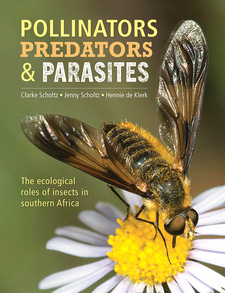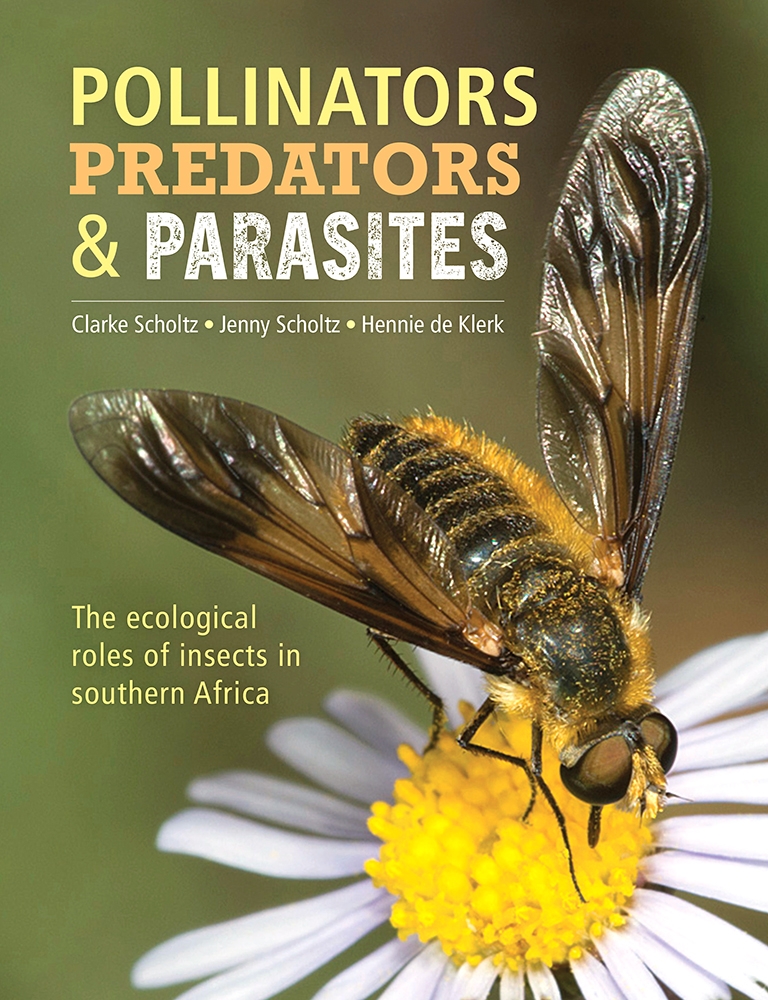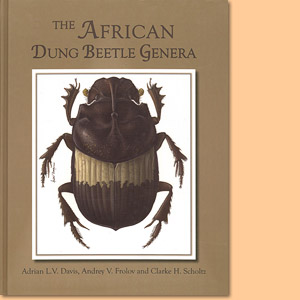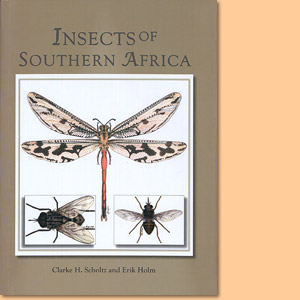Pollinators, Predators & Parasites. The ecological roles of insects in southern Africa, by Clarke and Jenny Scholtz and Hennie De Klerk

Pollinators, Predators & Parasites. The ecological roles of insects in southern Africa, by Clarke and Jenny Scholtz and Hennie De Klerk. Penguin Random House South Africa. Imprint: Struik Nature. Cape Town, South Africa 2021. ISBN 9781775845553 / ISBN 978-1-77584-555-3
Pollinators, Predators & Parasites. The ecological roles of insects in southern Africa, by Clarke and Jenny Scholtz and Hennie De Klerk, highlights and illustrates some of the interesting, often remarkable, aspects of insect life history in the different biomes and other regions where they occur, and emphasises their environmental importance as ecosystem service providers, something never done before for southern African insects.
Southern Africa is world renowned for its abundant and diverse wildlife, wide variety of indigenous plants and breath-taking scenery. The region has some of the highest concentrations of large African mammals left on the continent and plant and animal endemicity on the subcontinent is exceptionally high, probably as a consequence of the wide range of landscape and vegetation types in the region that distinguish nine distinct biomes. These ecological regions are characterised by particular soils, vegetation structure and associated climate, which support distinctive combinations of plants and animals. The biomes grade across the subcontinent from tropical forest in the east to desert in the west, with vastly different environments in between. South Africa, as a result of its position on the continent, has the most varied topography and, consequently, the highest biological diversity in the region, which contributes to its being recognised as the fourth most biodiverse country in the world (after Brazil, Colombia and Indonesia). But when biodiversity is discussed, it invariably refers to plant and higher vertebrate diversity, largely because most biodiversity scientists study plants and large animals, and because much less is known about the insect fauna. Accordingly, many readily accessible books have been written about southern African mammal and bird behaviour, while the complex behaviour of insects and the fascinating stories of their lives have remained hidden in hundreds of scientific publications. The stories reveal interactions between soil engineers and the landscape, pollinators and plants, insect predators and their prey, parasites and their hosts, and the sophisticated lives of social insects, as well as many other interesting aspects of their biology - presented here for the first time, featuring the most ecologically important and interesting insects in southern Africa. Although larger vertebrates and plants generate the most interest, approximately 80% of all multicellular organisms are invertebrates, and of these about 75% are insects (fig. 1). In southern Africa, about 50,000 insect species have been named, but it is thought that this represents less than half of the actual number still to be discovered and described. In comparison, there are roughly 23,000 species of plant, about 860 species of bird, and only 354 mammal species in the region. [...]
Clarke Scholtz is an emeritus professor of entomology at the University of Pretoria, with which he has had a 50-year association, teaching undergraduates, supervising postgraduates and doing entomological research. He has published 220 papers on insect systematic biology and conservation, two children's books on insects, three on dung beetles and has co-authored the standard regional reference book Insects of Southern Africa.
Jenny Scholtz studied nature conservation and worked for a conservation NGO. Her focus later turned to the study of insects, culminating in her co-authoring Pollinators, Predators & Parasites: The ecological roles of insects in southern Africa. She lives on a Karoo farm and is involved in a broad spectrum of conservation and environmental issues.
Hennie De Klerk studied and worked in the field of metallurgy but has nurtured a life-long interest in insects. Over many years, armed with camera and macro lens, he has dedicated his leisure time to photographing creatures in the wild, focusing on insects and bird behaviour. Since retiring three years ago he has immersed himself in the study of insects.
This is an excerpt from Pollinators, Predators & Parasites. The ecological roles of insects in southern Africa, by Clarke and Jenny Scholtz and Hennie De Klerk.
Title: Pollinators, Predators & Parasites
Subtitle: The ecological roles of insects in southern Africa
Authors: Clarke Scholtz; Jenny Scholtz; Hennie De Klerk
Publisher: Penguin Random House South Africa
Imprint: Struik Nature
Cape Town, South Africa 2021
ISBN 9781775845553 / ISBN 978-1-77584-555-3
Hardcover, 22 x 29 cm, 448 pages, 1600 color photos
Scholtz, Clarke H. und Scholtz, Jenny und de Klerk, Hennie im Namibiana-Buchangebot
Pollinators, Predators & Parasites. The ecological roles of insects in southern Africa
Pollinators, Predators & Parasites. The ecological roles of insects in southern Africa. A remarkable piece on the natural history of southern Africa's insect wealth.
The African Dung Beetle Genera
The African Dung Beetle Genera is an account on each of the 101 dung beetle genera known from Africa.
Insects of Southern Africa
Insects of Southern Africa he scientist offers general information, beautiful colour illustrations and a glossary.



